Canadian Navy already has a good name
Dec 6th, 2010 | By Counterweights Editors | Category: Canadian Republic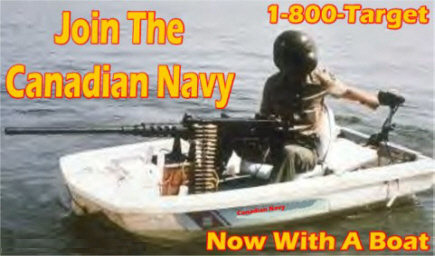
Some claim this satirical photo actually depicts a small US Coast Guard vessel! The Canadian Navy does say that its main priority right now is building ships, not worrying about its official name.
History, T.S. Eliot from St. Louis wrote long ago, has “many cunning passages” – even in places like Canada. Some radical populists who lived in Western Canada two or three generations ago would be aghast if they knew that some alleged radical populists in Western Canada today are trying to promote the ancient eastern cause of the British monarchy in northern North America.
Note, eg, the Western Standard “Shotgun Blog” from this past Friday, December 3, 2010: “The greatest victim” of the “modernizing jacobins” who invaded the Ottawa power structure back in the bad old days “was the monarchy. The dropping of the terms ‘Royal’ from the navy and air force was a not so subtle way of cutting Canada off from its past. Whereas other nations try to build traditions, as a way of strengthening a sense of national identity, the Canada of the 1960s decided to do away with as many traditions as possible. The quest for modernity took the form of a systematic amnesia. Now the amnesiacs who run Canada, and the military, are trying to prevent us from recovering one small, but important bit of what was lost.”
The underlying believe-it-or-not issue here flows from an obscure debate that has just taken place in the still unreformed Senate of Canada’s National Security and Defence Committee. Members apparently agree that “Canada’s naval forces should no longer be called ‘Maritime Command’” – the anaemic label by which they have been officially known since Paul Hellyer’s Canadian armed forces unification of 1968. But there is a big disagreement about just what the new name should be. And something must be done soon, because: “A recommendation from the committee on a potential name change is expected next year.”
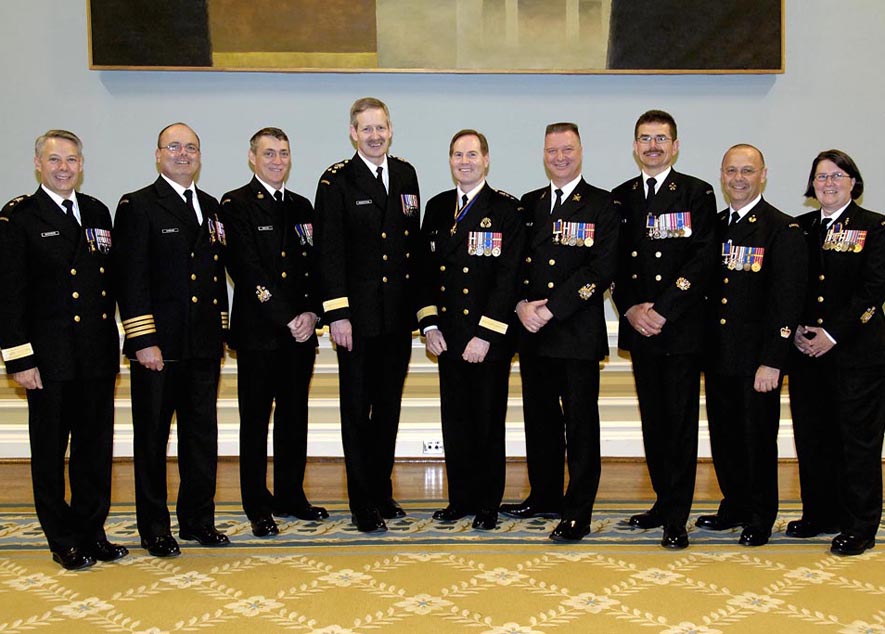
As Canada’s National Defence website explains this photo: “Eight members of the Canadian Navy were appointed to the Order of Military Merit during a recent ceremony at Rideau Hall in Ottawa.” Mmmm ... it would seem that it is already called just the “Canadian Navy”!
Liberal Senator Bill Rompkey from Labrador believes that our early 21st century naval forces should be simply and elegantly known as the Canadian Navy. (In fact the National Defence website, eg, already uses this term informally. Senator Rompkey is merely suggesting that this practice now be made official.) Another faction of the National Security and Defence Committee – involving Liberal Senator Joseph Day from New Brunswick, Conservative Senator Donald Plett from Manitoba, and Conservative Senator Fabian Manning from Newfoundland and Labrador – wants to return to the old pre-1968 designation of Royal Canadian Navy. And it speaks volumes about just what the Western Standard really is, in the last days of the year 2010, that this Return-of-the-Royal-Canadian-Navy side of the debate is the one it supports!
Senator Segal’s wise counsel …
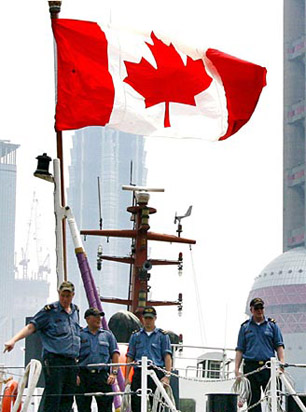
The Canadian Navy frigate Regina with 233 people on board arrives in Shanghai's Yangtze River port for a six-day friendly visit.
From one point of view, you might think that all this amounts to the proverbial tempest in a teapot, to say the very least – and you would no doubt be quite right.
Moreover, it has already been reported that no less an authority than “Kingston [Conservative] Senator Hugh Segal [from the old Loyal Eastern Ontario], an honorary colonel in the Navy …Â who sits on a senate committee that is considering changing the name of the senior service, said this weekend [well, now the weekend of November 27—28 in fact] that he is doubtful Canada’s naval force will –Â or should – ever restore its Royal Canadian Navy name.”
This is quite striking: Senator Segal has had a long and admirable career as an essentially high-minded but nonetheless influential political activist and senior policy advisor, at both provincial and federal levels of government.
He is also an avowed monarchist, who has, eg, in the recent past made particular efforts to ensure that current continuing references to the British monarchy be retained in the compulsory Canadian citizenship oath for new citizens. If he has concluded that “Royal Canadian Navy” is just not going to fly ever again, that is no doubt wise counsel, from a friendly source. Why bother beating this dead seahorse any longer?
The case for returning to “Royal Canadian Navy”
From another point of view, there are some small virtues in briefly contemplating a few other dimensions of this current debate about Canadian political symbols – even if it is taking place within an unreformed political institution, that, until it is satisfactorily reformed at last, does not and ought not to have any great influence on anything.
To start with, the Western Standard “Shotgun Blog” post of this past Friday (see above, and note that the official title here is “A Royal Pain”) does an impressive enough job of summarizing the case for reviving the old name of Royal Canadian Navy. Of course it is also true, it seems to us, that a similar logic could counsel replacing the new Canadian flag of 1965 with the old British red ensign. And that would be, no doubt, even more reactionary than going back to the old name of Royal Canadian Navy. As Senator Segal does seem to appreciate, ultimately, these ancient British imperial symbols have a dwindling electoral constituency in the year 2010. A government that pressed them too hard could come perilously close to seriously offending the modern Canadian democracy. Still, we would argue ourselves, last Friday’s “A Royal Pain” in the Western Standard probably makes as good a case as can be made for risking such an offence, in a very short space.
Even so, like so much other right-wing rhetoric these days, “A Royal Pain” can’t help finally stooping to vaguely paranoid delusions, that transcend the most obvious facts. The crucial offending passage here is the claim that: “Now the amnesiacs who run Canada, and the military, are trying to prevent us from recovering one small, but important bit of what was lost.” This claim flows from a late November Sun newspaper report that “Canada’s navy has told former sailors to shut up about changing the naval forces’ name back to Royal Canadian Navy, a senior officer [and member of something called the Naval Officers Association Canada (NOAC)] testified Monday [November 22, 2010, before the unreformed Senate committee].”
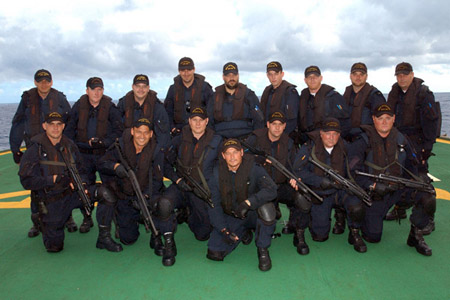
A Canadian Navy boarding team poses for photo aboard the Canadian Navy support ship Protecteur. Canadian Department of National Defence photo by Canadian Air Force Cpl. Joseph Morin.
Apparently the Western Standard missed the follow-up memo on this point from Canada’s navy itself. Just over eight hours after the Sun newspaper report on former sailors’ being told to shut up about “Royal Canadian Navy,” the same chain published a clarifying article: “The head of Canada’s navy says he never squashed efforts by former sailors to rename the naval forces the Royal Canadian Navy …‘Vice-Admiral Dean McFadden, chief of the maritime staff, has not provided any direction to the Naval Officers Association Canada (NOAC) regarding the proposed name change for Maritime Command,’ said Jennifer Eckersley, a spokeswoman with the Department of National Defence … Canadian Forces spokesman Capt. Dave Scanlon … [further clarified that] the navy had passed ‘no such direction’ to the NAOC, which is outside its chain of command … adding that at present, the navy’s focus ‘is on building ships.’”
The larger debate on the future of the British monarchy in Canada that inevitably lies ahead …
What may finally prove most interesting – and relevant – about the current debate over Canadian Navy vs Royal Canadian Navy, in the still unreformed Senate of Canada’s National Security and Defence Committee, is the way it anticipates the shape of a larger debate about the future of the British monarchy in Canada that certainly lies down the road, not too far ahead.
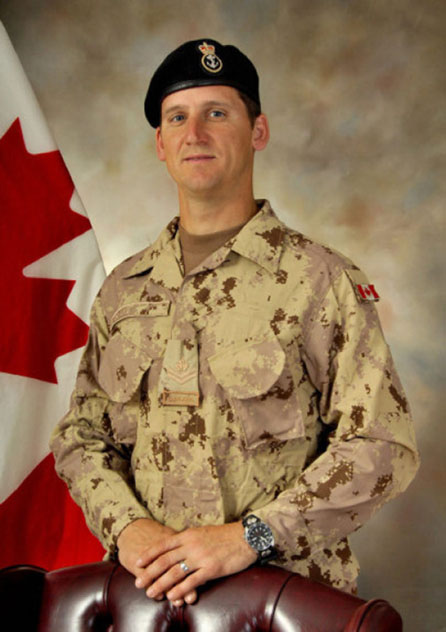
Petty Officer Second Class (Douglas) Craig Blake, 37, originally based in Shearwater, N.S., Fleet Diving Unit Atlantic (FDU-A), “the Canadian Navy's first soldier to perish in Afghanistan,” died May 3, 2010, when an improvised explosive device detonated about 25 kilometres southwest of Kandahar City.
The Western Standard’s “A Royal Pain,” it seems to us, similarly rather nicely summarizes the essential case for carrying on with the (now practically altogether insignificant) symbolism of the British monarchy’s formal role in Canada’s old Constitution Act 1867 as well: “Whereas other nations try to build traditions, as a way of strengthening a sense of national identity, the Canada of the 1960s decided to do away with as many traditions as possible. The quest for modernity took the form of a systematic amnesia.”
Since the early days of Pierre Trudeau’s regime, in 1970, a now well-developed organization known as the Monarchist League of Canada has spoken up loudly for the particular kinds of heritage principles that “A Royal Pain” articulates. It remains better organized than its Canadian republican and/or anti-monarchist opponents (in the midst of a populace which includes substantial numbers who understandably believe the entire subject of a monarchy in Canada is very close to a joke that deserves no serious attention at all, on either side).
So it is not surprising that the cause of Senators Day from New Brunswick, Plett from Manitoba, and Manning from Newfoundland and Labrador has been bolstered by “a recent petition of monarchists” with “more than 5,000 signatures calling for the Royal Canadian Navy to be the name once again.”
At the same time, recent opinion polls continue to show that at least a bare majority of Canadians, from coast to coast to coast, would like to see the country’s connection with the British monarchy end – at the end of the reign of the present monarch in any case (as a matter of typical Canadian politeness and so forth, one might say).
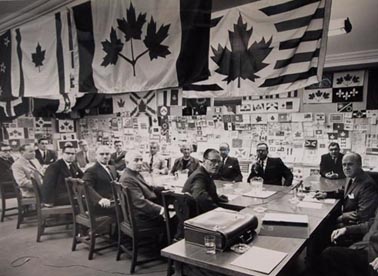
Committee in Ottawa with literally thousands of different designs submitted for new independent Canadian flag, 1964. Photo by Cliff Buckman, Queen's University Archives.
And so it is also not surprising that: “Numerous retired members of the navy have suggested the rank-and-file don’t want Royal in the name, and some senators believe it conjures up a colonial past that doesn’t reflect the modern Canadian navy as independent.” And: “Opponents say the Royal Canadian Navy brings back ideas of colonialism and is insensitive to francophones, aboriginals and new Canadians who cannot identify with the term … ‘I’m ok with Maritime Command changing to Canadian Navy, but adding the term Royal I think is really exaggerated,’ said Bloc Quebecois defence critic Claude Bachand … Royal Canadian Navy just doesn’t recognize the reality of Canada in 2010, said Rompkey … ‘We are an independent and unique country,’ he said.”
Three cheers for Senator Bill Rompkey from Labrador …
We have no doubt at all on which side of these debates we stand (both the smaller one about the official name of Canada’s navy, and the larger one on the future of the British monarchy in Canada more generally). And it isn’t the same side as the Western Standard!
We are not altogether dismissive of certain aspects of the heritage argument that “A Royal Pain” presents so tidily, in such a short space. There certainly is some point, it seems to us, in trying to “build traditions, as a way of strengthening a sense of national identity.” Yet as the eminent British historian J.H. Plumb has nicely pointed out, in the context of the history of the United Kingdom itself: “Traditions are quickly bred and quickly destroyed and they snap suddenly in a world of rapid social change.” And there is no point in trying to revive traditions that have already snapped: that will only weaken not strengthen the sense of national identity.
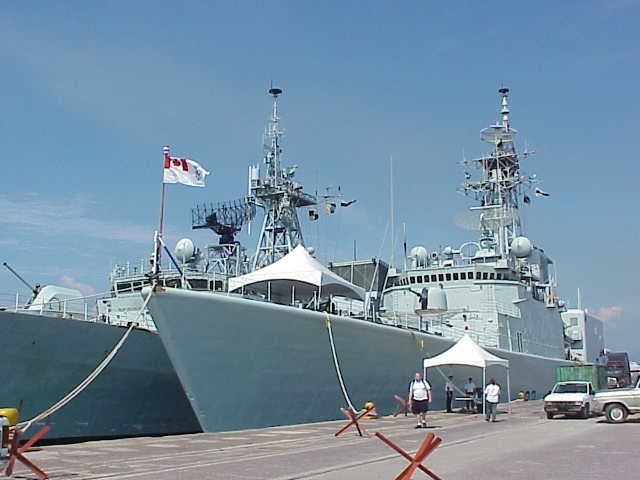
Ships of the Canadian Navy, tied up at pier in Manzanillo, Mexico. Note current naval flag of independent and unique country.
Moreover, in the longest sweep of modern Canadian history since the 16th century, the British empire itself usurped more than a few authentic Canadian traditions – “French and Indian,” as an earlier generation used to say – in the late 18th and earlier 19th centuries. So the Loyalist Mohawk chief Joseph Brant once nicely quipped about the new British North American Province of Upper Canada: “Governor Simcoe has done a great deal for this province. He has changed the name of every place in it.” Quite a lot of what the Western Standard’s “A Royal Pain” post calls the “systematic amnesia” in the Canada of the 1960s’ “quest for modernity” was in fact an attempt to recover still earlier strands of the Canadian past, that British imperial colonizers like John Graves Simcoe tried to obliterate by their own forms of systematic amnesia.
In any case, we stand for the legacies of the most ancient multiracial fur trade that first breathed life into the transcontinental Canadian confederation we know today – and for the latest multicultural legacies of the global village in Canada, pioneered by the old greatest empire since Rome on which the sun once never dared to set. We are with the opponents who “say the Royal Canadian Navy brings back ideas of colonialism and is insensitive to francophones, aboriginals and new Canadians who cannot identify with the term.” We are even with Bloc Quebecois defence critic Claude Bachand, who is “ok with Maritime Command changing to Canadian Navy,” but thinks “adding the term Royal … is really exaggerated.” And we are especially with Senator Bill Rompkey from Labrador, who feels that “Royal Canadian Navy just doesn’t recognize the reality of Canada in 2010.” As Senator Rompkey has also nicely put it: “We are an independent and unique country” in Canada today. We need to be building traditions that strengthen our future as this kind of country – and not our faded colonial past.



I am in the Canadian navy and I would love to have the royal put back in. There are many units in the military with the prefix Royal (RCR, RCD ect…)
But who is paying your salary — or those of the other units? The Royals in another country? Or the Canadian taxpayer?
Hey Harry
Like it or the not, those “Royals in another country” are our Royals as well; get over yourself.
Hey Jordan : They may be your Royals. They’re not mine. Opinion polls show the Canadian majority is increasingly on my side. And nowadays Canada is a democracy, where the majority rules. So it’s going to be you who will have to, as you say in your bullying old colonel blimp way, “get over yourself.” Sorry, but that’s the real world. The British monarchy did play a useful role in an earlier Canada, I think myself. But that Canada has now evolved into something a bit different, slowly but surely. See Lorne Gunter’s column, eg, in the National Post a few days ago. Cheers.
Harry,
I understand what you mean about a new and modern Canada, but why can we not modernize the monarchy and attempt to renew public interest in the Queen. I believe that being a monarchy makes us more independent of the United States by showing that we are not ruled by the american president. I think we should strengthen our old traditions and hold tight since many of them are drifting away with political correctness.
I respect your opinion though.
I’m with Harry. Canada today is a democracy. In the very end we are and should be ruled by the Canadian people, not the president in the US or the Queen in the UK. But if we keep trying to be a monarchy somehow, when more and more Canadian people just aren’t interested, the democracy next store is going to start looking more and more attractive to many in Canada. And that’s the last thing I want to happen. I respect your views Christian. But I just don’t think they can work in the 21st century. We have to become our own country or forget it: March or Die.
I spoke to the Queen in June 19, 1959 when she came to open the Seaway. This was in Gander, Nfld. I was also on Parade in Halifax ( Citadel Hill ) at the end of July to accept her WHITE ENSIGN prior to her leaving Canada.
I was off Cuba – thanks to Adm. Ken Dyer to help after; Batista & Castro had their TIFF.
I sailed the east coast for Pres. John Kennedy to keep Russian Subs & Convoys away from Cuba because of the Russian Missiles there… thanks to Adm. Ken Dyer. We did it …..
I had a good life as a Canadian Sailor, saw the demise of the Avro Arrow and sailed our Sub Chasers that were Canadian made & 2nd to none. Just asked the Nautalist after her under ice voyage…. we got her 9 out of 10 times ….. US Navy Adm’s could not believe it….
Leave the ROYAL in and keep your Political Noses out of this – Officers got their CURL give us our ROYAL ( this was also an edict – don’t rock the boat & just TO give us our Curl ! )
Ed
ex RCN 42767-H
Toronto, Ont.
We have the great honor to serve Her Majesty and therefore we must correctly designate Her loyal colonial military branches. This allows us to reach towards uniformity with other Imperial forces. I only wish you could have delivered your arguments personally to King Henry The VIII.
[CWeditors: George we can only assume is kidding here, or being satirical; we will put together a coda on this whole sorry mess in the near enough future. Meanwhile see “Royal Colonial Nonsense … Harperites obeying the dictates of an ‘invisible majority’” by former Globe and Mail editor Geoffrey Stevens!]